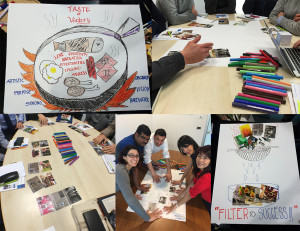
Practicing happiness the MainAd way
How do you define happiness and is it truly possible to maintain happiness? And what about work? It is just a dream or could it be possible to be happy at work, where most of us spend most of our life? The question is worth our attention as positive work cultures have proved to be more productive and cost efficient.
MainAd, as an international ad tech company, deals with diverse personalities within, and external to, the business. Therefore, it is important for us to ensure happiness within the workplace amongst employees is intact. Helping others, not financially but, by giving them our time and energy, we spread positivity. We continue to spread this idiom as it enhances the strongly built relationships in our teams across the globe.
Gross National Happiness for economic growth
Gross National Happiness is a term invented by the Fourth King of Bhutan, Jigme Singye Wangchuck in the 1970s. The idea of the GNH is that the quality of life and contentment of the nation’s people is a predecessor to its economic development. It’s a new way of measuring national prosperity, which does not have to solely be based on economic wealth. Although this movement was initiated by the King of Bhutan with the belief that the GNH is Bhutanese, its notions are still applicable to any nation, situation and individual. Similarly, we at MainAd invest in our people, as their well being is directly related to the growth of our company.
Redefining the meaning of happiness
According to Daniel Kahnerman, a Nobel prize psychologist notable for his work on behavioural economics, happiness can be defined in two ways. The first is about having a life without problems, full of joy and pleasure and the second is related to a life that is meaningful and well-lived. The second option seems a lot more realist and durable.
So, the key is to redefine the meaning of happiness. According to Paul Dolan, professor at the LSE, purpose and pleasure are basic constituents of happiness: so we can be happy even in a difficult experience if we live it with a sense of purpose. After having a purpose, we can make any change we want, we can overcome difficulties, we can make deliberate choices and we can finally focus on what is important for us.

MainAd’s offices around the world took part in a ‘Happiness by Design’ project to emphasise the importance of defining a work-life well-being by identifying personal and group purpose.
In this project MainAders shared their likes and dislikes on processes and situations. We used ‘the coaching game’, an Israeli tool, to better understand and achieve clarity of complex situations in our working lives. Through images and sentences, the team reach unexpected corners in their minds, enabling to express complex issues and find answers to sometimes difficult questions. This simple but efficient form of communication, gave the team the opportunity to find different recipes to success.
MainAd strongly believes in four drivers of happiness (HAPI):
Higher purpose – With a purpose, one can make any change we want, overcome difficulties, make deliberate choices and finally focus what matters for personal growth.
Autonomy – Freedom of making choices and being in charge of your own decisions, which gives one a sense of responsibility.
People – Being involved with other individuals on a day-to-day, sharing mutual interests and working towards a common goal.
Impact – When one is involved in something that positively impacts a situation or another individual, it gives you a sense of gratification, purpose and achievement.
These drivers are crucial in a corporate environment, where diverse personalities come together and work towards the same aim. This requires the ability to proactively adjust oneself to any given situation. Workplace happiness can drive corporate growth and boost a company’s internal and external reputation, hence companies should focus on keeping their people and the community at the heart of our business. It is what binds our unique personalities and cultures.
Although the International Day of Happiness is marked once a year on 20th March, we can find ways to spread the positive energy and acknowledge its principles as an ongoing practice to embody in our lives, beyond this day.
By Alessandro Rasetta PhD, University Professor. Corporate Consultant at MainAd, and an independent professional working with international organisations, with the goal to create a world in which people want to belong.